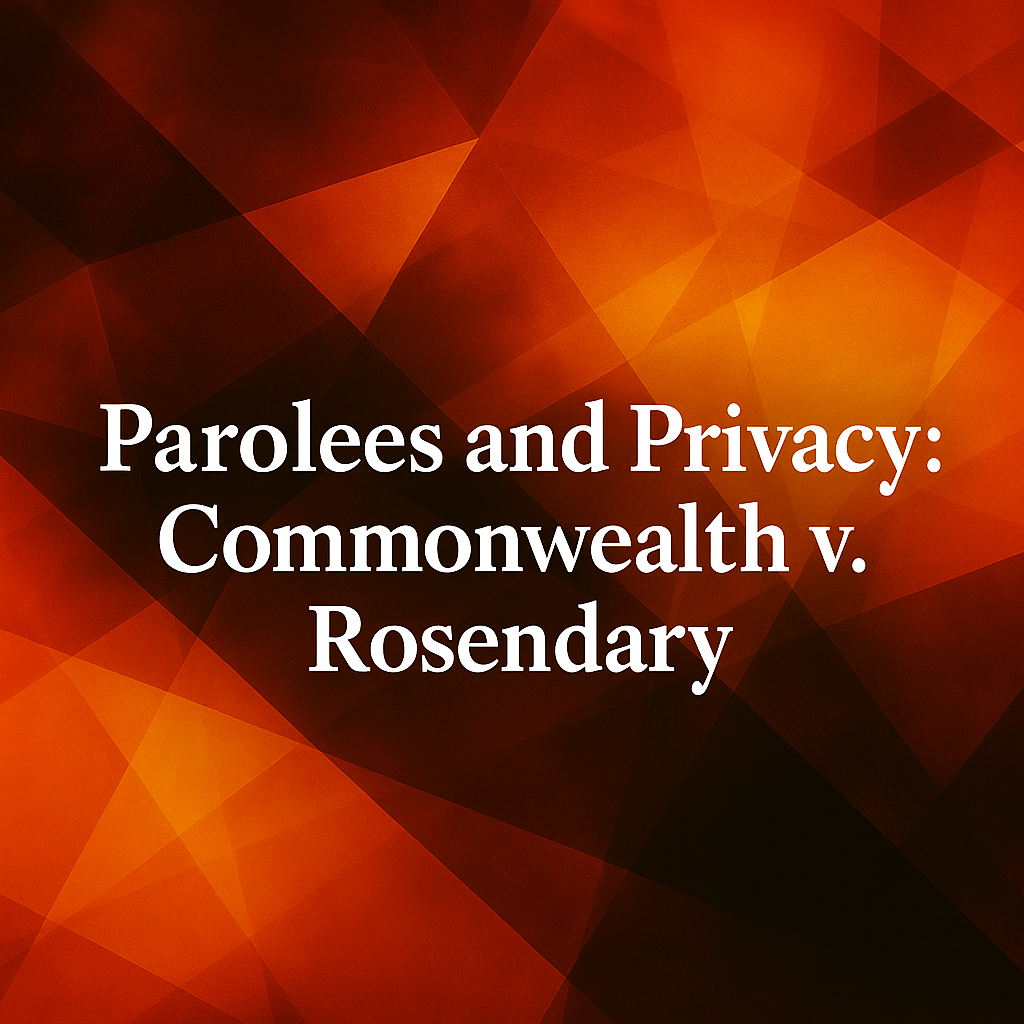Parolees and Privacy: Commonwealth v. Rosendary Reaffirms the Limits of Fourth Amendment Protections for Supervised Individuals
Sept. 21, 2025
 In Commonwealth v. Emire Salem Rosendary, 2024 PA Super 51, the Pennsylvania Superior Court issued a significant ruling clarifying the diminished privacy expectations of individuals on parole, particularly in relation to GPS monitoring data. The case reaffirms longstanding principles in Pennsylvania and federal constitutional law concerning the boundaries of the Fourth Amendment for parolees and underscores the legal reach of probation and parole supervision.
In Commonwealth v. Emire Salem Rosendary, 2024 PA Super 51, the Pennsylvania Superior Court issued a significant ruling clarifying the diminished privacy expectations of individuals on parole, particularly in relation to GPS monitoring data. The case reaffirms longstanding principles in Pennsylvania and federal constitutional law concerning the boundaries of the Fourth Amendment for parolees and underscores the legal reach of probation and parole supervision.
Factual Background
The case arose from a violent incident that occurred in March 2020. Rosendary was accused of lying in wait in the victim’s vehicle for nearly two hours before committing a gunpoint robbery, followed by a physical assault. At the time, Rosendary was on state parole for a prior robbery conviction and was being monitored by GPS as a condition of his supervision. He had been released less than six months prior to the new offense.
After his arrest, prosecutors introduced Rosendary’s GPS data at trial to help establish his location during the time of the robbery. This data was obtained from his parole officer without a search warrant.
Rosendary filed a motion to suppress the GPS evidence, arguing that the use of the monitoring data constituted an unreasonable search under the Fourth Amendment and Article I, Section 8 of the Pennsylvania Constitution. The trial court denied the motion, and he was ultimately convicted by a jury.
Appellate Issues and Arguments
On appeal to the Superior Court, Rosendary raised a single issue: whether the Commonwealth violated his constitutional rights by using GPS monitoring data collected during his parole supervision without first obtaining a warrant.
Rosendary’s argument relied on general Fourth Amendment principles, asserting that tracking an individual’s movements via GPS constitutes a search and that the government’s failure to obtain a warrant rendered the evidence inadmissible.
The Commonwealth responded by emphasizing that parolees, unlike members of the general public, are not entitled to full Fourth Amendment protections. Their status as supervised individuals inherently diminishes their expectation of privacy. In this case, the GPS monitoring was a condition of Rosendary’s parole—imposed not arbitrarily, but as a direct response to prior noncompliance and new criminal charges.
The Court’s Ruling
Writing for the panel, Judge Sullivan upheld the trial court’s decision and ruled against Rosendary. The opinion rests on three major legal findings:
Diminished Privacy for Parolees:
The court reiterated that parolees are not entitled to the same level of Fourth Amendment protection as ordinary citizens. By accepting parole, individuals agree to conditions that permit increased governmental oversight, including searches and monitoring without the usual procedural safeguards.GPS Monitoring is Not a New or Unreasonable Intrusion:
The court found that GPS monitoring was a reasonable condition of parole and that its use in tracking Rosendary’s location in connection with criminal activity was consistent with established law. The court emphasized that this was not a surreptitious government search but rather data collected openly as part of his parole supervision.No Warrant Required for Lawful Sharing of Parole Data:
The court concluded that the sharing of GPS data between the parole officer and prosecutors did not constitute a separate search that would require a warrant. Since the monitoring was lawfully imposed as part of parole, and the data was accessed through proper channels, there was no constitutional violation.
Broader Implications
The Rosendary decision aligns with a long line of cases recognizing the special status of parolees and the balance courts must strike between individual privacy and public safety. It reinforces the legal authority of probation and parole officers to monitor, investigate, and cooperate with law enforcement without obtaining a search warrant for every piece of compliance data.
Defense attorneys representing parolees should remain vigilant in reviewing how supervision conditions are implemented, but the decision makes clear that constitutional challenges to routine GPS monitoring are unlikely to succeed unless there is a showing of bad faith, harassment, or particularly intrusive conduct outside the bounds of supervision.
Conclusion
Commonwealth v. Rosendary serves as a reminder that parole is not liberty unqualified. While supervised individuals retain core constitutional protections, their rights are necessarily narrowed under the weight of prior convictions and continued government oversight. In this case, the use of GPS data collected during lawful parole supervision was deemed admissible—even absent a search warrant—because of Rosendary’s status and the clear link between the data and new criminal conduct.

